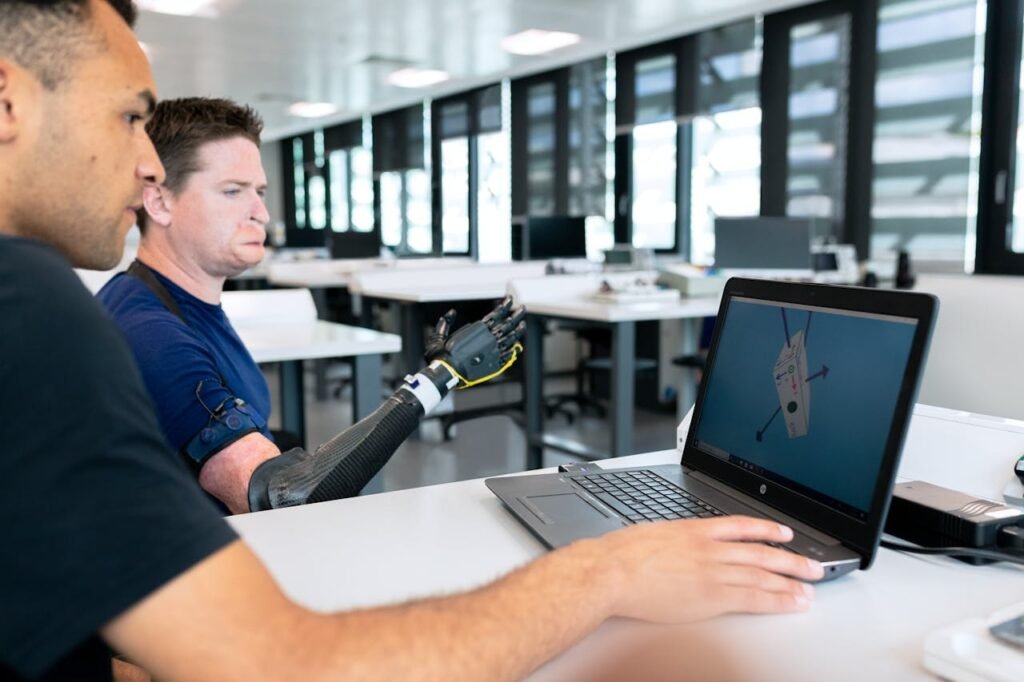Emotional Support Animals (ESAs) are more than just pets—they are companions that provide comfort, stability, and emotional well-being to individuals facing mental and physical challenges. For people with disabilities, ESAs can play a transformative role in their daily lives, offering not only emotional relief but also a sense of purpose and companionship.
In this article, we’ll delve into the vital role of emotional support animals, explore how they differ from service animals, and understand their impact on the lives of people with disabilities. We’ll also examine how individuals and businesses can better accommodate and integrate ESAs into everyday life, fostering a more inclusive society.
The Difference Between ESAs and Service Animals
While emotional support animals and service animals are both integral to supporting individuals with disabilities, they serve distinct purposes and are classified differently under the law.
Understanding Emotional Support Animals
Emotional support animals are primarily meant to provide comfort and companionship. They help alleviate symptoms of mental health conditions such as anxiety, depression, post-traumatic stress disorder (PTSD), or other emotional challenges.
Unlike service animals, ESAs are not required to perform specific tasks or be trained for specialized roles. Their presence alone can significantly improve the emotional state of their owner.
For example, someone with chronic anxiety might find solace in the calming presence of a dog or cat. This emotional connection can reduce stress levels, promote relaxation, and even prevent panic attacks. While their role is less task-specific than that of service animals, their impact can be equally profound.
The Role of Service Animals
Service animals, on the other hand, are trained to perform specific tasks that directly aid individuals with physical or sensory disabilities. For example, a guide dog assists a person with visual impairments in navigating their environment, while a service dog for someone with epilepsy might detect seizures and alert others.
Service animals have legal protections under laws like the Americans with Disabilities Act (ADA) in the U.S., which grants them access to public spaces where pets are typically not allowed. ESAs, by contrast, may have fewer legal privileges, depending on local regulations.

The Emotional Benefits of ESAs for People with Disabilities
Emotional support animals provide a unique kind of support that is deeply tied to the human-animal bond. For individuals with disabilities, this bond can translate into improved mental health, greater independence, and a higher quality of life.
Companionship and Connection
Living with a disability can sometimes lead to feelings of isolation. Emotional support animals help bridge that gap by providing constant companionship.
A dog greeting its owner with unwavering excitement or a cat curling up for a nap on their lap can ease feelings of loneliness and provide a source of unconditional love.
This companionship also encourages routine and structure. Caring for an animal—feeding, grooming, and playing with it—can give individuals a sense of purpose, promoting mental well-being and fostering self-esteem.
Stress and Anxiety Reduction
One of the most significant roles of emotional support animals is their ability to reduce stress and anxiety. Interacting with animals has been shown to lower cortisol levels (a stress hormone) and increase oxytocin (the “love hormone”), creating a calming effect.
For individuals with disabilities, the presence of an ESA can act as a grounding force during moments of distress. Stroking a dog’s fur or hearing the rhythmic purring of a cat can be a sensory experience that soothes the mind and body, helping to manage symptoms of anxiety or depression.
Promoting Emotional Resilience
Emotional support animals also play a key role in fostering emotional resilience. Their unwavering presence reminds individuals that they are not alone in their journey, providing a sense of stability during challenging times.
For people navigating disabilities, this emotional support can help them face daily obstacles with renewed strength and confidence.
For example, an individual with PTSD might experience flashbacks or heightened stress in specific situations.
The calming presence of an ESA can serve as a grounding mechanism, helping them regain control over their emotions. This support builds a sense of safety and predictability in an otherwise unpredictable world.
Encouraging Social Interaction
Emotional support animals often act as social connectors, facilitating interactions that might otherwise feel daunting.
A person with social anxiety might find it easier to engage in conversations when walking their dog, as the animal provides a natural topic of discussion and a buffer in social settings.
These interactions can help individuals build relationships, foster community connections, and reduce feelings of isolation. Over time, the companionship of an ESA can give individuals the confidence to venture out more frequently, broadening their horizons and enhancing their quality of life.

The Physical and Cognitive Benefits of ESAs
While the primary role of emotional support animals is to improve emotional well-being, their impact often extends to physical and cognitive benefits.
Boosting Physical Activity
Many emotional support animals, particularly dogs, encourage physical activity. Regular walks, playtime, or even light grooming tasks can promote physical health.
For individuals with mobility challenges, engaging in physical activity through their ESA can improve circulation, reduce stiffness, and enhance overall vitality.
This activity also has mental health benefits, as physical exercise is known to release endorphins, which improve mood and reduce symptoms of depression.
The act of caring for an ESA creates a sense of routine, which can be especially beneficial for individuals with disabilities seeking structure in their day-to-day lives.
Enhancing Cognitive Function
For people with cognitive disabilities or conditions such as autism or dementia, emotional support animals provide sensory stimulation that can improve focus and cognitive engagement.
The simple act of interacting with an animal—stroking their fur, tossing a toy, or giving commands—engages multiple senses, which can help sharpen cognitive skills over time.
Animals are also excellent at responding to nonverbal cues, making them particularly effective companions for individuals with speech or communication challenges.
The bond they share helps foster nonverbal communication, enhancing both understanding and emotional expression.
Training and Certification: How to Get an ESA
Obtaining an emotional support animal involves more than simply adopting a pet. It requires understanding the steps involved in identifying the right animal and ensuring that it meets the criteria for an ESA.
Choosing the Right Animal
While dogs and cats are the most common emotional support animals, any domesticated animal that provides comfort can qualify. The key is to choose an animal that aligns with your lifestyle and needs.
For example, a person living in a small apartment might find a cat or small dog more suitable than a larger animal.
It’s also essential to consider temperament. An ESA should be calm, friendly, and responsive to their owner’s needs. Visiting shelters and spending time with potential candidates can help identify the right companion.
Understanding Certification
In many countries, including India, emotional support animals require certification to be officially recognized. This certification typically involves a letter from a licensed mental health professional stating that the animal is necessary for the individual’s well-being.
It’s important to research local regulations regarding ESAs, as their rights and privileges can vary widely. While some places may allow ESAs in housing or travel accommodations, others might limit their access compared to service animals.
Training and Behavior
While emotional support animals are not required to undergo specialized training like service animals, basic obedience training is essential.
An ESA should be well-behaved, calm in public, and responsive to their owner’s commands. This ensures a positive experience for both the owner and others around them.
For example, a dog that is overly excitable or barks excessively could create stress in public settings. Conversely, an ESA that is well-trained provides consistent comfort and remains a dependable companion.
Many trainers specialize in working with ESAs, offering programs tailored to their role as emotional supporters.

The Importance of a Strong Bond
The bond between an emotional support animal and its owner is foundational to its effectiveness. Building trust and understanding takes time and patience, but it’s a deeply rewarding process.
Activities such as grooming, playing, and spending quiet time together strengthen this connection, ensuring that the animal is attuned to the owner’s emotional cues.
For instance, a dog might learn to recognize subtle signs of stress, such as changes in breathing or body language, and respond by providing physical comfort. These intuitive responses form the cornerstone of the animal’s support role.
Navigating Public Spaces with ESAs
While emotional support animals play a vital role in the lives of their owners, navigating public spaces with an ESA can sometimes present challenges. Understanding the rights and responsibilities of ESA owners, as well as fostering awareness among businesses and the public, is essential for a positive experience.
Rights and Accommodations
In many countries, ESAs are granted certain rights in housing and travel contexts. For example, in India, airlines may allow emotional support animals on flights, provided appropriate documentation is submitted.
However, ESAs may not have unrestricted access to all public spaces, unlike service animals.
It’s crucial for ESA owners to research and understand local regulations. Carrying the necessary documentation, such as a certification letter from a mental health professional, can help avoid misunderstandings when accessing housing, transportation, or other accommodations.
Educating the Public
Businesses and organizations can play a significant role in creating a welcoming environment for emotional support animals. Training staff to understand the distinction between ESAs and service animals and how to approach ESA owners fosters inclusivity.
For instance, a restaurant might train its staff to handle ESA-related inquiries respectfully, ensuring that both the owner and other patrons feel comfortable.
Public awareness campaigns highlighting the role of ESAs can further reduce stigma and misconceptions, making shared spaces more accessible.
Promoting Positive Interactions
Owners of emotional support animals also bear responsibility for ensuring that their animals are well-behaved and considerate of others. Clear communication can go a long way in preventing misunderstandings.
For example, if an ESA is present in a crowded area, the owner might explain its role to curious individuals to foster mutual respect.
Businesses can support this by establishing clear policies for accommodating ESAs while balancing the comfort of all patrons. For example, providing designated spaces for ESA owners in settings like parks or cafes can make the experience smoother for everyone involved.
Emotional Support Animals as Catalysts for Inclusion
The role of emotional support animals extends beyond individual well-being—they are powerful catalysts for fostering inclusion in society. By creating environments where ESAs are understood and accommodated, we take meaningful steps toward normalizing diverse needs and experiences.
Changing Perceptions Through Visibility
One of the most powerful ways ESAs promote inclusion is by normalizing the presence of support animals in public and shared spaces.
Seeing ESAs accompanying individuals with disabilities creates visibility for nontraditional needs and challenges, encouraging society to rethink stereotypes about mental health and physical disabilities.
Businesses can actively contribute to this shift in perception by making their environments more welcoming to ESAs. For instance, a café or retail store that accommodates emotional support animals signals to customers that they value inclusivity and recognize diverse needs.
This welcoming attitude not only benefits ESA owners but also educates other patrons, fostering broader acceptance and understanding.

Bridging the Gap Between Communities
Emotional support animals often act as social facilitators, making it easier for their owners to connect with others. This is particularly impactful in public settings where individuals with disabilities might otherwise face barriers to engagement.
For example, an ESA accompanying its owner to a park or event can spark conversations and interactions that might not have occurred otherwise.
Businesses and community organizations can build on this dynamic by creating ESA-friendly programs or initiatives that bring people together.
Hosting events such as “ESA Appreciation Days” or workshops on mental health awareness provides opportunities for individuals to share their experiences, reducing stigma and promoting empathy.
These efforts contribute to stronger, more connected communities, while also positioning businesses as leaders in inclusive practices.
Building Inclusive Policies
For businesses, fostering inclusion through emotional support animals requires more than just accommodating them in physical spaces—it demands proactive policy development.
Clear, ESA-friendly policies help set expectations for both staff and customers, ensuring a positive experience for everyone involved.
For example, a hotel chain that adopts a policy allowing emotional support animals in rooms demonstrates its commitment to inclusivity. By training staff to handle ESA-related requests with professionalism and empathy, the business ensures that its policies are implemented effectively.
This creates a welcoming environment for ESA owners while minimizing misunderstandings or disruptions.
Amplifying the Role of Education
Businesses play a crucial role in educating the public about the value of emotional support animals. Through marketing campaigns, community outreach, or employee training programs, they can highlight how ESAs contribute to emotional well-being and inclusivity.
For instance, a transportation company might create awareness campaigns showcasing how ESAs help individuals navigate stressful travel situations.
By framing these stories in a positive light, the company not only promotes its ESA-friendly policies but also fosters greater understanding among passengers.
The Broader Impact of Emotional Support Animals
Emotional support animals (ESAs) do much more than provide individual comfort—they create ripple effects that impact families, workplaces, and communities.
These animals foster a culture of empathy and understanding, prompting people to rethink how society accommodates mental health and disability. By recognizing their significance, we can unlock their full potential as agents of positive change.
ESAs and Family Dynamics
For families, an emotional support animal can play a unifying role. When a family member has a disability, the presence of an ESA can ease stress and create a more harmonious environment.
Children with disabilities, for example, may find solace in the unconditional companionship of an ESA, which can help them process emotions or navigate social challenges.
Additionally, ESAs often encourage shared activities, such as walking, playing, or grooming. These activities promote bonding, reduce stress within the household, and foster a sense of teamwork.
Families frequently report that their ESA becomes a cherished member of the family, contributing to emotional stability and mutual understanding.
Transforming Workplaces
The inclusion of ESAs in workplace settings is gaining attention as businesses recognize the importance of supporting employees’ mental health.
While ESAs may not be suitable for every work environment, progressive workplaces are exploring ways to integrate their presence responsibly.

For example, flexible policies that allow remote work or designated “pet-friendly days” can make it easier for employees to benefit from their ESA’s calming influence.
Businesses that embrace these initiatives often find they contribute to reduced stress, increased morale, and a more supportive work culture.
Community Integration
At the community level, emotional support animals create opportunities for social engagement and inclusion.
Parks, recreation centers, and public events that accommodate ESAs foster a welcoming environment for individuals with disabilities, allowing them to participate more fully in community life.
For instance, a town that organizes ESA-friendly community walks or events not only benefits individuals with ESAs but also promotes awareness and acceptance among other residents.
These initiatives create a sense of belonging, breaking down barriers that might otherwise isolate people with disabilities.
The Future of Emotional Support Animals
As awareness of emotional support animals grows, so does their potential to reshape how we think about mental health, disability, and inclusion. With advancements in training, technology, and policy, the role of ESAs will likely expand, offering even greater benefits to individuals and society.
The Role of Technology
Technology is already making waves in how ESAs interact with and support their owners. Devices like wearable trackers can monitor the health and behavior of ESAs, ensuring they are well cared for.
These tools can also provide insights into how an ESA impacts its owner’s mental health, creating data-driven opportunities to enhance their bond.
Virtual platforms are also helping individuals connect with trainers, veterinarians, and ESA advocacy groups, making it easier to integrate ESAs into daily life.
Businesses that invest in ESA-friendly technology—like apps for registering support animals or platforms that provide real-time ESA access information—position themselves as leaders in this growing space.

Policy and Advocacy
Future policies will likely emphasize broader accommodations for ESAs, reflecting their growing recognition as vital companions. Advocacy efforts by individuals, organizations, and businesses will play a crucial role in shaping these policies.
By contributing to conversations about ESA accessibility, businesses can influence regulations that balance the needs of ESA owners with the expectations of the broader public.
Supporting initiatives like ESA-friendly public transportation or workplaces demonstrates forward-thinking leadership while fostering societal inclusivity.
Conclusion
Emotional support animals are much more than companions—they are lifelines that enhance emotional well-being, bridge social divides, and foster resilience.
For people with disabilities, ESAs open doors to greater independence, confidence, and connection, offering support that is both profound and transformative.
For businesses and communities, embracing ESAs is a powerful way to demonstrate a commitment to inclusion. Whether it’s through accessible policies, ESA-friendly spaces, or public education, creating a supportive environment benefits everyone.
At Robobionics, we understand the importance of tools that restore dignity and independence. Just as our prosthetic solutions, like Grippy™, empower individuals physically, emotional support animals empower people emotionally. Together, these resources form a holistic approach to overcoming challenges and thriving in daily life.



